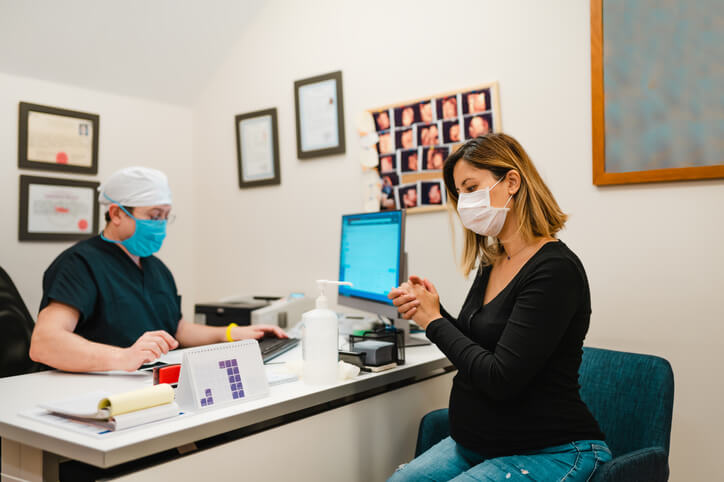How Gestational Surrogates Can Protect Themselves (and Stay Sane)
Becoming a gestational surrogate has always been an exciting, but stressful, experience. Now, with the COVID-19 pandemic, it’s even more so.
How can you protect yourself, your family and the intended parents’ baby?
You already know how to have a healthy and positive pregnancy, but the coronavirus brings new challenges. Here’s how you can enjoy a healthy and happy pregnancy and surrogacy journey, even in the midst of global pandemic:
1. Follow the CDC Guidelines
This is a fairly obvious tip, but is nonetheless important for everyone.
Remember to:
- Stay home as much as possible.
- Limit contact with people outside your household.
- Wear your mask when in public.
- Wash your hands frequently.
- Try to maintain a six-foot distance from others.
- Immediately call your doctor if you experience any symptoms of COVID-19.
While it’s easy for you to control your own vigilance in adhering to the prescribed precautions, it’s harder to enforce it upon others. Remind your family members to keep up with the same safety measures, so they don’t expose you to the illness or become sick themselves.
2. Keep Up With Your Prenatal Appointments
You’re probably a little hesitant to go to the doctor’s office or the fertility clinic right now. But skipping necessary appointments isn’t really an option, either.
Ask your doctor to arrange telemedicine appointments whenever possible to help limit your risk of exposure. There will, of course, still be plenty of appointments that you must attend in person. When you do go into a clinic or hospital, always follow the CDC-recommended precautions and adhere to your doctor’s new COVID-19-related policies.
Your doctor’s office will likely ask you to keep your mask on and wash your hands before and after entering the building, and they’ll probably take your temperature before you come in. It’s also a good idea to call ahead and ask about their policy regarding people accompanying you. If your spouse or the intended parents wish to be at an appointment, you’ll want to know whether or not they’ll be permitted to go with you before you all show up.
3. Designate a Person to Help With Groceries and Errands
To help reduce unnecessary potential exposure to COVID-19, you may want to ask your spouse or another trusted loved one to handle the shopping and errands for your family for a while.
You might consider grocery delivery when possible and try to limit trips to necessary shops. You might also remind your designated shopper to be extra careful with the standard COVID-19 precautions — remind them to wear a mask in the store, to wash their hands before and after their shopping trip and to try to stay six feet away from others. Wiping down shopping carts before use is also a helpful prevention measure.
Because you can’t control how well your designated helper protects themselves while they’re out and about on your behalf, ask someone who you trust. You might even consider organizing a person to bring the essentials to your elderly or immunocompromised neighbors, too, so you could all help to pay your shopper while getting what you need and staying safe.
4. Get Your Exercise In
Many gyms are still shut down, and it can be hard to find new ways of exercising while social distancing. However, it’s important to keep moving. Exercise is necessary for your mental and emotional health, as well as your physical well-being.
Regular, low-impact exercise is even more important for women who are planning to become pregnant or who are already pregnant.
A few simple ways to get active while staying cautious during COVID-19 could include:
- Taking the kids or pets for a long walk or bike ride
- Going for a jog on a quiet trail
- Trying out some YouTube workout sessions in the living room or yard
- Playing some casual sports with your family in the yard or in a spaced-out area of the park
Even just 20 minutes of activity can keep you (and your family) feeling healthy, strong and positive.
5. Continue to Hydrate and Eat Healthily
A lot of us are succumbing to unhealthy snacking and are getting sick of cooking during the pandemic! Even though you’ve been cooped up, try to focus on eating healthily and drinking plenty of water throughout the day.
If you need some help, rope your family members in for meal preparation. It’s hard to remember to eat healthy when you’re busy caring for children and handling daily tasks, so it’s alright to ask for some help.
Your physical, mental and emotional state will benefit from it, and staying healthy will boost your immune system.
6. Take Time to Care for Your Mental Health
These are stressful times. And while becoming a surrogate has always been a very emotional experience, those natural worries and feelings are now intensified by the threat of the pandemic.
It has always been important to reduce your stress if you are pregnant or planning to become pregnant. But with more stressors at hand, it’s even more important for you to take care of yourself mentally and emotionally. Your mental and emotional state also has a large impact on your physical health.
With kids at home and day-to-day tasks to deal with, it can be hard to set aside “you time,” but start considering it as part of your health routine. Even 15 minutes of relaxation per day can make a difference in your mood and overall well-being.
Try to make some time for whatever recharges and relaxes you, whether that’s:
- Taking a soothing bath
- Reading someplace quiet
- Going for a walk
- Listening to a podcast or some music
- Engaging in your favorite hobby
- Getting some exercise
- Taking time for meditation or prayer
- Or catching a quick nap
Try to limit your stress as much as possible, and try to make some extra time for rest and relaxation.
7. Remind Those Around You to Adhere to the Appropriate Precautions
This is something you have less control over, but it is still vital for minimizing your risk of exposure to COVID-19 and illnesses in general.
You may need to limit the number of people you come into contact with during your surrogacy journey. Try to stay within your “quarantine bubble,” and when you are around people outside of that “bubble,” ask them to follow the CDC’s recommendations for coronavirus prevention. Now may not be the best time to have people over for a backyard barbecue, but you and your family still have to go out into the world to function sometimes!
It can be awkward to ask others to wear their masks, wash their hands around you, or ask them to keep a six-foot distance — but you have the perfect (and very valid) excuse of being a gestational surrogate who must be overly cautious of her health.
It’s even more important for the people in your “quarantine bubble” to adhere to precautions when they leave the home, so they don’t expose themselves and then spread the virus to you. It can be tough to get your children to take the necessary precautions or for your spouse to completely eliminate risk of exposure if they’re back at work. Just ask that they all do their best, and encourage them to continue to use caution as much as possible.
It’s still safe to become a gestational surrogate or to continue your surrogacy journey during this pandemic. Just remember to take care of yourself and exercise reasonable caution! You can always contact your American Surrogacy specialist with any questions or concerns about how the coronavirus may affect your pregnancy and journey as a surrogate.









